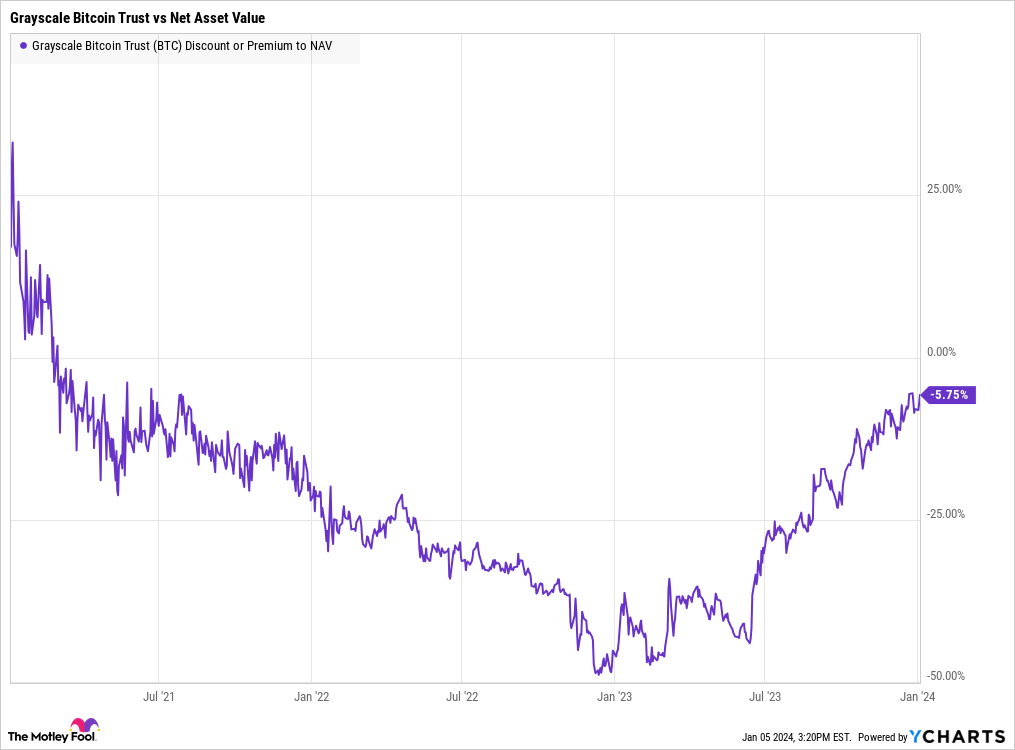Thirteen spot Bitcoin (BTC 0.77%) ETFs are currently awaiting approval from the Securities and Exchange Commission (SEC).
Up to this point, the SEC has denied similar exchange-traded fund (ETF) applications, but an appellate court ruled the SEC’s rejection was “arbitrary and capricious.”
The approval of a spot Bitcoin ETF would be big news for investors of all sorts. Whether you’re heavily invested in crypto or simply stashing money away in a retirement account, it’s worth paying attention to the SEC’s decision. It could open the door for many more investors to easily put their money to work in the emerging crypto asset class.
Why the new breed of Bitcoin ETFs is big news
Existing Bitcoin funds like the Grayscale Bitcoin Trust use derivatives like futures contracts to track the price of Bitcoin. However, those funds cannot actually redeem Bitcoin futures for the underlying asset, which can result in prices that diverge widely from the actual value of Bitcoin. Grayscale Bitcoin Trust notably traded at almost a 50% discount to its net asset value in late 2022.
GBTC Discount or Premium to NAV data by YCharts
A spot Bitcoin ETF, on the other hand, will actually hold Bitcoin. That means the ETF will be able to track the value of the cryptocurrency much more closely.
Additionally, since the funds will hold Bitcoin instead of a derivative, it makes it more transparent for investors as to what they’re buying. Each share of the ETF will correspond with a certain amount of Bitcoin held by the fund.
That said, spot Bitcoin ETFs will still charge fees for shareholders in the form of expense ratios. And with such strong interest in the new breed of ETFs, it’s important for investors to pay attention to these fees and what they mean for their investment.
Here’s how much you’ll pay in fees to own a Bitcoin ETF
The following four fund companies have detailed how much they plan to charge investors holding their respective Bitcoin ETFs.
| Fund | Expense Ratio |
|---|---|
| Fidelity Wise Origin | 0.39% |
| Invesco Galaxy | 0.59% |
| Valkyrie | 0.8% |
| ARK 21Shares | 0.8% |
Data source: SEC Filings.
Invesco Galaxy plans to waive the fee for the first six months for the first $5 billion in invested assets. That’s not an uncommon strategy for new funds entering a competitive market. However, it might not be worth it for long-term investors to try to buy shares of the Invesco fund and then switch to a lower-cost fund after the free period expires once you account for taxes.
It’s also worth pointing out that most of the proposed ETFs haven’t detailed their fees. Blackrock is notably missing from the above list. Given the size of the fund company, investors should expect it to offer a relatively low fee.
Most importantly for investors, it should be noted that the published fees are all well below the expense ratios for existing Bitcoin investment products. Grayscale charges a 2% management fee. The ProShares Bitcoin Strategy ETF charges 0.95%. So, not only will investors get a fund that tracks Bitcoin better, it will be cheaper, too.
On top of that, there are a few other reasons investors may want to pay the fees for a spot Bitcoin ETF.
The benefits of Bitcoin ETFs
For many investors, a spot Bitcoin ETF will be the easiest and safest way to invest in the cryptocurrency.
While it’s simple enough to open an account at a crypto exchange and buy Bitcoin, it’s not so simple to open a retirement account with a crypto exchange. You’ll have to establish your own self-directed individual retirement account (IRA) and use that to open and fund an account with a cryptocurrency exchange. And that’s not cheap. For most investors simply looking to use Bitcoin for portfolio diversification, an ETF makes much more sense despite the fees.
There’s also the convenience of being able to hold your Bitcoin investment in the same account as your other investments. That gives you a better picture of your overall portfolio without having to aggregate everything across multiple accounts.
For many investors, the technical hurdles involved in buying and securely holding Bitcoin can be cumbersome. With an ETF, the managing institution will take care of those technical aspects. The institution will likely use multiple levels of security and cold storage to maximize the safety of the Bitcoin it holds for investors.
Ultimately, the fees on the new spot Bitcoin ETFs are extremely reasonable, even compared to standard index funds. Take for instance the Invesco QQQ Trust, which tracks the Nasdaq 100 index. It charges an expense ratio of 0.2%. So, paying as little as 0.39% for a Bitcoin ETF isn’t going to break the bank.
Adam Levy has positions in Bitcoin. The Motley Fool has positions in and recommends Bitcoin. The Motley Fool has a disclosure policy.













